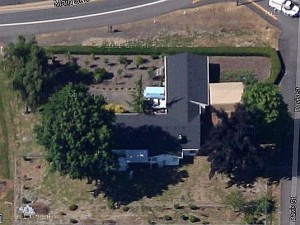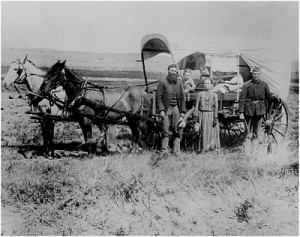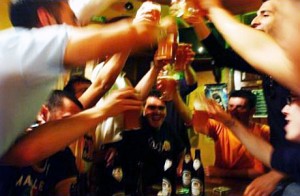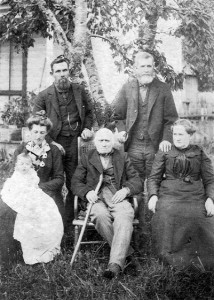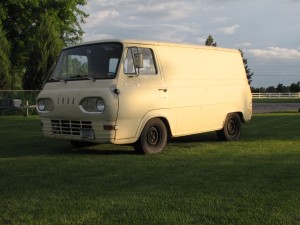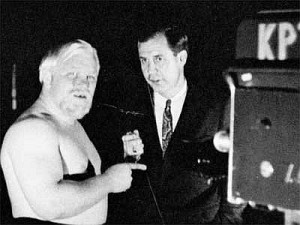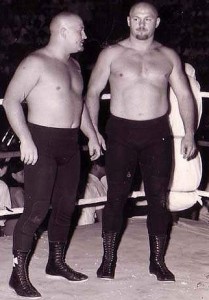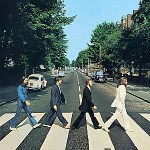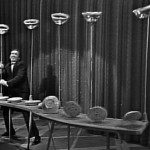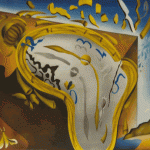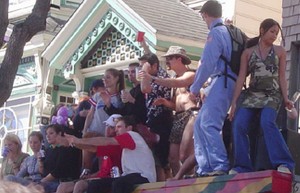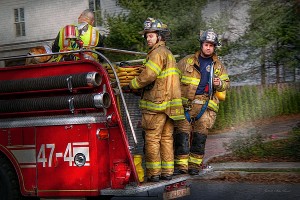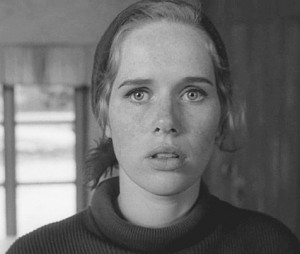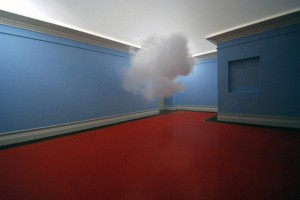The compound really was L-Shaped. The curve was maybe more accurately a variation of a Z, as the two sharp corners were at right angles. I believe we referred to it as the S-Curve because there was a yellow warning sign erected by the state up the road from us indicating just such a thing. I think it was the sign that designated the curve as being an S, rather than a Z. These concepts didn’t arise from out of nowhere. We didn’t arbitrarily make such grand proclamations.
And it may be true, too, that the corners weren’t exactly at a tight ninety degrees, but were maybe a bit soft at the shoulders and banked slightly, most likely serving as a means to buffer Chief Shellenbarger’s house from oncoming drunks leaving Monmouth and failing to negotiate that first turn in the road over to Independence—where they would be heading, no doubt to buy beer. Imagine our good fortune. We at the L-Shaped House on the S-Curve were availed of the protection of Independence Police Chief Harvey Shellenbarger, who lived just across the little side road on the east side of our property.
It would seem that our house, situated in Monmouth, Oregon, twenty miles from anything even remotely resembling civilization would not have required the amount of security we were afforded. For, living to the other side of us, on the west side of the house, was Monmouth Police Chief Ron Miller. Chief Miller had a small gentleman’s farm of a few acres behind his property and ours, where sheep grazed peacefully and the skies were not cloudy all day. We never spoke to either of those guys, that I know of, but kept a respectful distance—although at some point they must have become aware of our presence there.
Monmouth was a dry town at the time. I think that finally got voted out about ten years ago. Monmouth not selling alcohol was the raison d’etre for the town of Independence. Actually, truth be told, Independence was out there first, when the wagon loads of sight-seers from Independence, Missouri first hit the valley back in the 1840s.
About ten years later a crazy religious faction (who could have seen that coming?) from the Independence party, headed by some guy with a chunk of property, broke off and moved the (then) considerable distance of a couple miles west to found a college and a town, or vice versa. They named it Monmouth—after someone’s hometown back in Illinois.
And, in order to form a more perfect anomaly in the region, the land for the college was deeded to the town with the wild-assed stipulation that no demon alcohol would ever slip the lips of some mid-19th century coed trying to bust out of his or her petticoats. I guess the deed was secured for a thousand years or something, because it took a city-wide vote to finally get booze (legally) into Monmouth—even though the law had never stopped anyone before anyway. I bet that when they legalized booze in Monmouth, the Independence City Council had to have an emergency budget meeting. Gnashing of teeth.
So, at that time, there was a near constant modern-day wagon train trekking to Roth’s Foodliner for beer and wine, or to the liquor store in downtown Indep for the hard stuff. The Cooler was the first available tavern, about a half a mile from the City Limits sign as you entered from Monmouth. But the Tap Room in downtown Independence was the preferred destination for most OCE students, prices being the key variable, one would suppose—that and perhaps the perpetual atmosphere of alcohol and hormone-fueled conviviality that forever foamed from their doors.
And, as these drunk minions eventually found their way back to their dorms and apartments, and classes the next day, the first structures they would encounter upon entry back into the City of Monmouth would be, from left to right: Chief Shellenbarger’s ugly, landlady green bastion, our white haven of sweet surrender, and Chief Miller’s stately sky-blue pleasure dome plumped upon a little artificial hill, sheep passively foraging about the grounds.
Prior to the arrival of Tom and Doug into the household, the L-Shaped House on the S-Curve was just an ordinary innocuous ‘50s ranch house of oversized proportions. The house itself was a massive drab white, rectangular structure, with a doublewide drive-through carport that adjoined a workshop area that was the size of a small Italian restaurant.
Our landlady, Jacki, lived in Salem and had a bunch of stuff stored out there from after the divorce, so we used the space for storage too, as much as was necessary given that there were, after all, college students living there with little more than a pot to piss in. Just the same, empty, that workshop could have comfortably housed one of those pioneer families from the 1840s. It was considerably bigger than the “apartment” Masa, Jeff and I had shared the year before.
Tom and Doug moved in the day after Fred showed them the room—about two hours after Jeff had cleared the nondescript remainder of his belongings from the space. Packing his 1968 Austin Healey Sprite convertible with that last load, Jeff lovingly encouraged his shiny precious red beauty in the driveway to a final, orgasmic wail. And in one effusive burst, he sped off in a spray of gravel with a hearty hi-yo go fuck yourself.
The two new roommates arrived presently in a boxy, nondescript pale-green Ford van. The first thing they loaded into the sizable room they were going to share was an enviable record collection. In an instant the ambience within the residence metamorphosed. There were officially four hippies living there—or hippies by Monmouth standards, anyway. Free thinkers, with crazy notions. Possibly subversive. In a dry town. Four hippies and a tennis bum who was rarely around.
They were from Bend. Doug Sherman was a year older than Tom and I. He had spent his freshman and sophomore years attending Portland State University, working on a Geography major. But, instead of continuing with the program, he impulsively opted to join Tom in Monmouth to become a History teacher. Doug was of moderate height, slouchy, a little mushy. He wore wire-rimmed glasses and had a scraggly beard, with thin, dull brown, shoulder-length hair.
A transfer from Central Oregon Community College, Tom Schiffer was very handsome. He had a close-cropped full beard, with long thick, wavy brown hair that reached his collar. Sturdily slender, nearly six-feet tall—as with so many other guys in my circle, he too had been a wrestler in high school and, built such as he was, probably wrestled in the 170 lb. weight class. He had indelibly blue eyes and a model’s grin. And he happened to be a pretty nice guy, though clearly crafty-sly and quite intelligent.
Doug, of course, was immediately identifiable as a 99.9999 percentile proto-genius. He spoke. In. Biting. Clipped. Clenched. Phrases—which typically concluded with a sarcastic summation and a wry, rattling chuckle, more often than not expressing an ambiguous sense of hopeless futility couched within his dim worldview. His encyclopedic knowledge on practically any subject often came in handy. Valuable and entertaining. He was a footnote factory. A human reference book.
In an apparent attempt to ingratiate us with our neighbors—once they had settled in Tom and Doug conspired with Fred to launch a kegger of titanic proportions. Since I did not imbibe, I had no real skin in that game. However the twist came with Doug’s unique idea to charge three dollars for entry into the affair and maybe make a profit to be put toward rent and bills. For that I was more than willing to chip in fifteen bucks in order to secure a keg from the Cooler, reasonably sure I could make my money back. And anyway, I was just going to stay in my room, so what the hey, let the beer kegs roll!
And that’s precisely what happened. I stayed in my room as well-nigh one hundred people showed up to drink beer in our living room, dining room and kitchen, with the stereo set at volume: stun, and weed enough to keep the magic happening. And there was plenty of room for all of it. That’s how immense just that portion of the house was.
It was Saturday night and things were really rolling by nine or so, by which time I was safely ensconced in my bedroom with a quart of Royal Crown Cola and a bag of Doritos, preparing to watch Portland Wrestling on Channel 12. I had taken a liking to the new announcer Frank Bonnema whose cheeky sarcasm and knowing suspension of disbelief suited the inane behaviors of the participants. While pointlessly strumming my trusty 12-string guitar in time to the Hamm’s, the beer refreshing, commercial that preceded the commencement of the program, a rap came at my bedroom door.
I bade entre and in wafted a tall, spare woman in a long, pale blue, flower print dress. Wild, raven, witching hair flew about her face, a country sunny face, with frightened hurt brown eyes. She introduced herself as Mary, whom I surmised to be Tom’s girlfriend, Mary—whose description he had given me on several occasions and she fit.
Hesitantly, she asked if she could hang out with me. She had caught a ride from Bend with a friend earlier in the day to pay Tom a surprise visit at his new domicile. But she was the one dumbfounded by the chaos she encountered upon her arrival, and like a frightened doe sought refuge far away from the frenzied din.
Having always been sympathetic to the plight of miserable panicked creatures, I reluctantly acceded— despite the fact that her presence created an intrusion upon the personal space I so dogged guarded, and was disinclined to frivolously relinquish. But she seemed pretty desperate. So yeah, okay. Sure. C’mon in.
Mary sat down on Varney’s bed, which hadn’t been slept in for weeks, taking stock of the mostly empty room. Like all other aspects of the house, it was grandiosely spacious, with just our two single beds pushed distantly apart to opposing mucus green walls. A ridiculously massive closet lay at the far end of the facility, across a great, yawning canyon of gray-carpeted floor.
A small, sunflower yellow wooden table was situated beneath the window wall between us, upon which I had placed my enormous black, reel-to-reel tape recorder (with its own built-in amplifier and speakers). Next to it, Varney set his portable Philco stereo with turntable and detachable speakers. He had about fifty albums stacked on his side of the table. I had maybe double that many on my side.
As we took in the preliminary matches, Mary gave me a bit of her version of their back-story (I had heard Tom’s, of course). They had gone together in high school, but started to drift apart when they both began attending COCC. During winter term Tom unexpectedly elected to transfer to OCE and move in with Doug in Monmouth. I knew they were on again off again. According to Tom they were off again. But from what Mary was saying she was under the impression they were still on.
We watched the Von Steigers take on Tony Borne and Lonnie Mayne in a match for the Northwest Tag Team championship. The Borne and Mayne team won on a blatant disqualification: the Von Stigers seemingly incapable of containing their contempt for the rules of the sport. Meanwhile, Mary told me about her childhood spent in the desolate southeastern Oregon desert town of Burns—our conversation seeming as tawny gray and windblown as the days of her cheerless formative years.
That one being an unquestionable success, there were other keggers to follow, each better attended and more efficiently managed than its predecessor. It was a very tightly run operation, in which I participated in the preparation before and the renewal efforts after those events, but in the interval of their duration, I remained safely secreted in my room, secure from any unnecessary inane interaction. And for enduring that occasional imposition, our rent and bills were paid for the entire spring term. What’s more there were residuals, which were used to purchase large quantities of top-grade marijuana. So it was a very happy household, indeed.
With Varney AWOL and Fred spending the preponderance of his time at Campbell Hall making things, Tom, Doug and I pretty much had the hacienda to our selves—the Three Musketeers. We spent afternoons after class smoking weed, watching TV with the sound off, and turning each other on to our favorite albums.
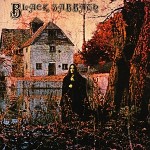 Doug was drawn to the harder, heavier or more primitive bands—MC 5, Steppenwolf, Deep Purple, Sabbath and Vanilla Fudge, the Velvet Underground and the Grateful Dead. Tom was a Zep fan. He loved the Who, Cream, Hendrix, and the Doors. Beginning at the Beatles, I was more of a pop man myself, with a bent toward folk rock. I held Simon and Garfunkel in high esteem and had become quite enamored of the Moody Blues, and the likes of Nilsson, the Byrds, Buffalo Springfield, the Bee Gees, and especially Jethro Tull.
Doug was drawn to the harder, heavier or more primitive bands—MC 5, Steppenwolf, Deep Purple, Sabbath and Vanilla Fudge, the Velvet Underground and the Grateful Dead. Tom was a Zep fan. He loved the Who, Cream, Hendrix, and the Doors. Beginning at the Beatles, I was more of a pop man myself, with a bent toward folk rock. I held Simon and Garfunkel in high esteem and had become quite enamored of the Moody Blues, and the likes of Nilsson, the Byrds, Buffalo Springfield, the Bee Gees, and especially Jethro Tull.
So, between the three of us and with what Fred and Varney had—there were well over five-hundred albums in the house, as well as a wide selection of 8-track and reel-to-reel tape recordings. Our rock and roll audio library was comparable in breadth and scope to that found at Alexandria, though there is little doubt that we had the superior selection of Rolling Stones albums.
In the interest of scientific inquiry and my never-ending quest to rediscover the Land of Cartoons, I devised an experiment undocumented in the annals of all recorded music. Quintuple Abbey Road. Others may have attempted to summit that illusory musical mountain in the past. But it was I who had the inspiration, the stamina, the dedication and the abundant free time to conceive and accomplish such a lofty goal.
You may well ask and I might be inclined to tell you: what the hell is quintuple Abbey Road? And just such a question would immediately set you apart from the typical American who walks through life unencumbered by such weighty concerns. The simple explanation is this: Quintuple Abbey Road is an inter-dimensional jaunt through the crack in time. Sure. That may sound simple enough. But just try it.
Obviously, five sources with the capability of reproducing sound will be required. And five identical recordings capable of being played on those apparatuses will be essential as well. In my case, I chose the Beatles’ Abbey Road, because I had a vinyl copy, as well as a reel-to-reel version. Doug, Varney and Fred had the album in the vinyl format as well. It was the only album in the house of which we had that many. We had four copies each of Bookends and In Search of the Lost Chord. But, for reasons unknown, five seemed to be the proper number and the Beatles’ Abbey Road seemed to be just the right recording to do the job. And thus it was so.
Conceive if you will, the notion: sound sources in various locations within a structure simultaneously playing the same album. And you might logically reply: Well that’s not so difficult to do with speakers. Simply intersperse them around your site and voila! Ah, but what I was suggesting was not a single sound emanating from a single source via an array of speakers. I proposed multiple sounds operating from separate sources—invoking the fourth dimension: Time, and the fifth dimension: a perpendicular to that. A definitive audio hologram.
And so I set about accomplishing my task. I equipped each of my sources with their specific versions of Abbey Road. Then, beginning in our room with my reel-to-reel tape recorder as the control mode, I began the process by playing Side Two. “Here Comes the Sun” was the lead track. As George Harrison’s acoustic guitar began to chime through the speakers of the recorder, I set the needle down on Varney’s copy on his turntable. After some effort I synchronized the tracks so that they were essentially in unison. Then I sprinted into Tom and Doug’s room and got another version in sync there on Doug’s modular stereo.
By that time the three recordings had begun to fall out of synch slightly, at varying speeds, so jogging back into my room, I got the two versions coordinated there and dashed back to Doug’s stereo and got that matched up. Then on to Fred’s room to get a fourth copy started, before rushing back to the start to re-synchronize everything. It was like one of those stage acts where the acrobatic entertainer keeps plates spinning on poles.
Finally, with four Abbey Road’s emanating from what sounded like a quartet of separate dimensions, I sped to get my vinyl copy of the album started on Tom’s big stereo system in the living room. And, after another circuit of synchronizations, they were all more or less coordinated. The heavenly choir of “Because” radiated a thousand proclamations, resounding throughout the house. It was as if Abbey Road were beaming from all facets of the entire planet.
I lit a righteous celebratory doobie and strolled the grounds in a state of profound awe. The vortex of sound indistinctly shaded and shifted and faceted with every step. Time itself slowly unspun through the course of “You Never Give Me Your Money,” creating a gaping rip in the fabric of the universe. And, as the various recordings ever so slightly fell out of sequence with one another, massive clouds of sound were slung into the silent void—the sun casting strands of molten plasma into the depths of space. In other words—Cartoons realized!
It was in that precise moment of matchless rapture that Tom and Doug happened to walk through the front door after a hard day of classes. Except for me, the house appeared empty. Yet the mayhem and bedlam were biblical in proportion—Abbey Road brimming and spilling deluge all over everywhere. The Jericho horn of Joshua pealed thick sonic syrup, which dripped upon the Dali-esque pancakes of all humanity. The boys headed straight for the communal weed basket. Gold-old-old-en-en-en slum-um-um-bers-bers-ers….
After great deliberation I subsequently determined that quintuple Abbey Road was the maximum number achievable in our world. I became convinced that sextuple Abbey Road would cause universal consciousness to collapse in upon itself, becoming a black hole of excessively heavy musical gravity. In addition, there was a new deterrent. A prohibition had been enacted by the household preventing me from conducting further experiments in the realm of multiple source sound generation. So I sought my kicks elsewhere.
Beyond my own arcane weirdness, that sort of behavior was indicative of a communal penchant for the peculiar that would play itself out in many manifold and myriad ways in the days and months to come. My experiment only served as inauguration to the festivities. Our appreciation for the absurd was boundless, and we never ceased to find new and unique ways to express it. In fact that became our mission in life.
We started slowly. It was a natural progression. We didn’t force things. As a result of the regularly occurring keggers, the L-Shaped House on the S-Curve quickly began to acquire something of a reputation. In a town of seven thousand inhabitants, that wasn’t so hard to do. Especially when approximately eight percent of that population had been to a kegger down at that very L-Shaped House on the S-Curve.
As the impossibly perfect spring unfolded, we determined that we wanted to take the party outdoors for some fun in the sun. Because we had been severely neglecting the maintenance of the extensive grounds, the grass had soon grown to two-feet high beneath the hot daily sun. Even though Jacki had provided us with a rider lawnmower, none among us was much interested in taking the thing out for a spin to knock down some lawn.
So, rather than to tamp down a clearing in our fields, we decided instead to conduct informal afternoon parties on the roof of the house. It was a very wide roof, of course, capable of accommodating twenty or thirty people up there comfortably. We typically shot for a three to one ratio between women and men whom we invited up, with the intent of lending an air of exclusivity to the affairs. Hence, given those parameters, there was always an abundance of scantily clad young women frolicking about the property, a condition to which there were never any objections lodged.
To enhance the surroundings, we hauled Varney’s stereo speakers up there. With my tape deck hooked up to his system, I’d put extended reel-to-reel tapes on to play all afternoon. And we’d sit up there, drinking beer, smoking cigarettes—but no weed (we weren’t that brazen)—listening to tunes and waving at friends as they drove by in their cars, honking their horns.
Sadly, in early May, Doug thought he detected a bow in the roof, as if a huge load of snow had weighed down upon it for an extended period. After due consideration, we deemed that it would be improper for us, as mere tenants after all, to destroy Jacki’s roof (further) and we were forced to discontinue the roof parties, after throwing maybe only ten or twelve of them. We would have to search for other things to destroy.
That opportunity fell to us a few weeks later, when Jacki asked us to please knock down the grass. She was receiving complaints from the city. So the household, en masse, circled the rider mower with a sense of wonder and fear. None of us were particularly mechanically inclined. Just getting the damn thing started proved to be a challenge. But between the five us, we roommates managed to get it running.
 We alternated at first. Tom captained the maiden voyage, navigating the perimeter of the property with great difficulty. The mower kept clogging with grass and stalling. In the end we ended up setting the blade as high as it would go, with the new plan of making two passes. We determined that in the long run it would save time and it did. The rest of us followed with our own opportunities to operate the machine. After a couple of circuits each, we became rather matter-of-fact about the process, performing occasionally reckless maneuvers in order to impress the others, or ourselves. Somebody.
We alternated at first. Tom captained the maiden voyage, navigating the perimeter of the property with great difficulty. The mower kept clogging with grass and stalling. In the end we ended up setting the blade as high as it would go, with the new plan of making two passes. We determined that in the long run it would save time and it did. The rest of us followed with our own opportunities to operate the machine. After a couple of circuits each, we became rather matter-of-fact about the process, performing occasionally reckless maneuvers in order to impress the others, or ourselves. Somebody.
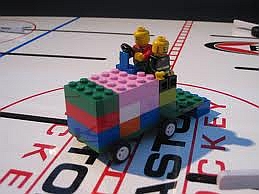 Once the first course was run, the grass was still eight inches high, but manageable at that point, so we prepared for the second tour. Confident that we had the process well under control, and to stave off boredom, we began to devise various gymnastics to perform atop the machine as it mowed the remainder of the lawn. Varney was the first, striking an awkward pose. With one foot planted upon the seat and one hand guiding the steering wheel, Varney hoisted a leg behind himself, and an arm pointing straight ahead, most resembling an ungainly ice skater riding a small Zamboni.
Once the first course was run, the grass was still eight inches high, but manageable at that point, so we prepared for the second tour. Confident that we had the process well under control, and to stave off boredom, we began to devise various gymnastics to perform atop the machine as it mowed the remainder of the lawn. Varney was the first, striking an awkward pose. With one foot planted upon the seat and one hand guiding the steering wheel, Varney hoisted a leg behind himself, and an arm pointing straight ahead, most resembling an ungainly ice skater riding a small Zamboni.
So the horse was out of the barn at that point and the game of one-upsmanship was by then fully engaged. Teams were formed, each creating an ever more farcical spectacle. The coda came with all five of us clustered on top of the poor tin beast. It did its best to bear up under the weight of a half ton, but as we made the final turn, it stopped abruptly, belching a big black cumulus cloud. It wouldn’t restart. Actually we couldn’t even get the motor to turn. It was obviously seized. Uh-oh. Jacki…
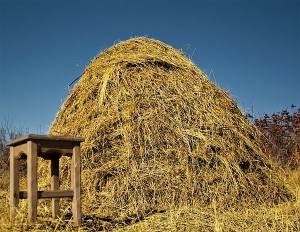 Well, we didn’t tell her about it right away—if we told her at all. But in an effort to ameliorate in advance any effects of our delinquency (if it were to become revealed), the five of us scrupulously raked the yard, gathering the grass into a great six-foot tall heap of clippings right in front of the house, clearly visible to cars making the turn on the S-Curve. When finished, we took turns making flying leaps into the mound. When all was said and done, we reconvened the haystack into a perfect pile.
Well, we didn’t tell her about it right away—if we told her at all. But in an effort to ameliorate in advance any effects of our delinquency (if it were to become revealed), the five of us scrupulously raked the yard, gathering the grass into a great six-foot tall heap of clippings right in front of the house, clearly visible to cars making the turn on the S-Curve. When finished, we took turns making flying leaps into the mound. When all was said and done, we reconvened the haystack into a perfect pile.
As a gesture of good faith, I crafted a sign out of a section of wood and a two-by-four. Upon it, with letters ten inches high in bright, day-glo colors I wrote “Free Grass,” and posted it at the top of Mount Lawn. As far as I recall, there were no repercussions with that, other than the Monmouth fire chief coming down from town a month later to tell us we had a fire-hazard on our hands. I think we ended up spreading that straw in the rhododendron beds.
There was a real fire in the neighborhood one day, at a house down Davis Street, the little lane that extended south from Chief Shellenbarger’s house. Jilly Bing was visiting, maybe waiting for Fred. We were still just becoming acquainted at that time—his friend then, in my mind. We were both being hesitant and shy and eccentric. She was sitting on the kitchen counter vacantly staring off into the ether, when suddenly a couple fire trucks went roaring down the tiny road, bells and whistles lit up officiously.
 A house located near the very back of our property was aflame and sustaining moderate damage. From the patio we could see a half-dozen heavily protected firemen, drenched with sweat, laboring under the hot sun, as they trudged fire hoses from the trucks in the direction of the fierce blaze. They were making every effort to quell the persistent fire before it could spread over to Chief Miller’s grazing fields behind us.
A house located near the very back of our property was aflame and sustaining moderate damage. From the patio we could see a half-dozen heavily protected firemen, drenched with sweat, laboring under the hot sun, as they trudged fire hoses from the trucks in the direction of the fierce blaze. They were making every effort to quell the persistent fire before it could spread over to Chief Miller’s grazing fields behind us.
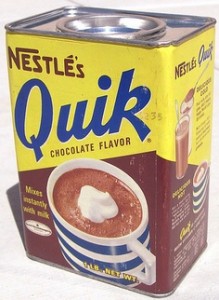 As she witnessed the swelter of their toil, a pang of compassion suddenly befell Jilly. She sprung to action with the aim of rewarding the fearless firemen. Quickly searching the cupboards, she set about the enactment of her plan. We had to make hot chocolate for them—as according to some tradition I had yet to ever hear about. But, I was not about to question Jilly’s motives when she was undertaking such a selfless cause, I directed her to Fred’s big can of Nestle’s Quik. He loved chocolate milk.
As she witnessed the swelter of their toil, a pang of compassion suddenly befell Jilly. She sprung to action with the aim of rewarding the fearless firemen. Quickly searching the cupboards, she set about the enactment of her plan. We had to make hot chocolate for them—as according to some tradition I had yet to ever hear about. But, I was not about to question Jilly’s motives when she was undertaking such a selfless cause, I directed her to Fred’s big can of Nestle’s Quik. He loved chocolate milk.
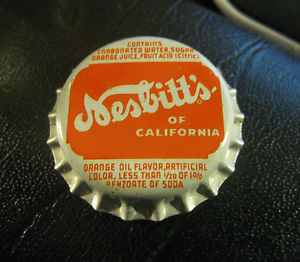 She grabbed the can and ran to the refrigerator in search of milk. Nothing. All we had was one can of evaporated milk, and the remnants of enough powdered milk to shake out about a cup of the stuff. Unless she pulled a loaves and fishes style enhancement of the milk supply the firemen’s hot chocolate was going to be pretty damn watery. Fortuitously, to her way of thinking anyway, someone had stashed a couple 28-ounce bottles of Nesbitt’s orange soda in the refrigerator.
She grabbed the can and ran to the refrigerator in search of milk. Nothing. All we had was one can of evaporated milk, and the remnants of enough powdered milk to shake out about a cup of the stuff. Unless she pulled a loaves and fishes style enhancement of the milk supply the firemen’s hot chocolate was going to be pretty damn watery. Fortuitously, to her way of thinking anyway, someone had stashed a couple 28-ounce bottles of Nesbitt’s orange soda in the refrigerator.
Without hesitation, she snapped up the Nesbitt’s and scurried over to the stove. She filled Fred’s big stockpot with the soda, the milk products, cocoa and a quart of water, heating it to a simmer. Noticing a bag of marshmallows on one of the shelves, she snatched those up and threw a handful of them into the pot to enrich the flavor and texture, as she lovingly stirred the ingredients. Meanwhile I scrounged up every coffee mug and cup we had in the house, grabbing my fake-antique Coca-Cola serving tray somewhere along the way.
 In an expression of genuine gratitude toward the firemen for their heroic efforts in the face of indeterminable odds and empyrean danger, Jilly very carefully set out eight cups of boiling cocoa, placing marshmallows in each full cup. It was as artistic as it was touching.
In an expression of genuine gratitude toward the firemen for their heroic efforts in the face of indeterminable odds and empyrean danger, Jilly very carefully set out eight cups of boiling cocoa, placing marshmallows in each full cup. It was as artistic as it was touching.
By the time she had all that together, the men had put the fire out and appeared to be in the wrap-up stages of their operations. As they were gathering up hoses just next to our driveway, Jilly, with great caution, very earnestly carried the tray of hot chocolate out to the profusely perspiring firefighters. Honestly, they looked at her like she was crazy or high, but I knew her well enough to know she was neither. She was uncommonly special.
And she was pretty. So the guys were more inclined to humor her and cut her a little slack—even if she was pretty weird. One of the braver among the firefighters took a sip of the concoction and fiercely spit it right out, asking what the hell was in that shit anyway. Jilly nonchalantly riffed through the list of ingredients, the orange soda in particular stuck out. Yeah, that’s probably what it was. Orange soda.
All the activity brought Rinnie out to see what the commotion was about. Rinnie lived under the neighbor’s disabled Plymouth station wagon at the house directly across the lane. He was a strange looking little dog—a longhaired German shepherd trapped in a Dachsund’s body. Because he clearly had received no attention other than to be fed periodically, and smelled of axel grease, and probably because he was keenly aware of his unfortunate circumstance in the scheme of all things, Rinnie was slightly anti-social.
He got overly excited in crowds and considered any living entity other than himself to be a crowd. I was the one to christen him Rinnie, after Rin Tin Tin (I don’t know what his real name was, or if he even had one), in hopes of elevating his desperately low self-esteem. It seemed he had internalized several critical issues from puppyhood regarding his stature in the world, issues which had manifest themselves in adulthood as a bad habit of acting out in a negative manner, barking and growling. Lashing out and such.
But he responded well enough to the name Rinnie. I let him come in the house occasionally and he always behaved himself like a little gentleman. He loved government-issue American cheese cubes and crusts from Fred’s home-baked bread. For the most part, he seemed to mean well, despite himself.
So there we were, Jilly and Rinnie and me, standing with the firemen who were holding coffee cups full of some gawdawful substance they wanted to dump on the ground, but were too polite to do right in front of the pretty little lady. But as the inevitable lull ensued, the fireman who had spit out his chocolate unceremoniously dropped his cup on the tray Jilly had cradled in her arms and hied the other fellas: time to head on back to the station.
Seeing that as their opportune sanction, the others respectfully bent over and emptied their mugs on the ground, as subtly as possible, returning their cups to the tray. One of the guys put his hand on Jilly’s shoulder and thanked her little too soulfully, in my opinion. But, eventually, off they went and peace was restored to the valley.
Only a few weeks after that, Jilly who didn’t drive, effortlessly convinced me to borrow Fred’s big Dodge truck so we could rescue her cousin, who was stranded in Lincoln City where she had been abandoned by Rainbow Bob—not the first time he had pulled a stunt of that nature. He was kind of a rat. I wrote a fictional (though true) account of that event and and it’s linked here. It was at that time into which my beloved dog Gypsy entered the picture, there to remain for the next fifteen years.
After the adventure to the coast to save her cousin, Jilly and I bonded and became much closer, spending nearly every day together until the end of June. Several afternoons a week, I would join her as she babysat for a favored instructor, Ram Dosa and his wife Bridget. Professor Dosa was of Indian origin. He had a dark complexion, with very blue features and a sparse black beard. A Hindu, he wore a turban, his forehead thumbed with a white ashpaste smudge.
Bridget was a beautiful blonde Swedish woman, tall and slender, with glacier blue eyes—a dead ringer for the actress Liv Ullmann. She was a teacher’s assistant in the Ed. Department at the college. They were wonderful people. In their mid-thirties. They had one child, a delightful young boy, age four, named Christian. Christian was the most beautiful little boy who ever lived.
His skin was the color of coffee cream, hair honey brown, with a radiant array of golden streaks. His eyes were unbearably limpid blue, wonder wide lagoons that peered out with an air of naïve wisdom that was oftentimes quite unnerving.
With both of his parents at work most days, a sitter was required for little Christian. Jilly had met Bridget in an Ed. class somewhere along the line and they hit it off instantly—undoubtedly because they were both very much alike in their bearing and demeanor. Jilly could have passed for Bridget’s younger sister.
Jilly was selected among only a few other students to be allowed to stay with Christian for five hours or more, while his parents were gone for the day. I knew Ram Dosa well from an Anthropolgy course I was taking from him that year. He was a wise, deeply spiritual man with incredible insights into mankind and the cultures of men around the world.
 Eventually, once his parents had become comfortable with my presence in their son’s midst, I was permitted to babysit Christian a few times. Typically we didn’t do much, staying around the family house, reading books, watching Sesame Street. Or we would sit in his play area in the back yard and confer on matters. When outside, our sessions were more creative. We would identify shapes in clouds, or try to hear what that butterfly over there said.
Eventually, once his parents had become comfortable with my presence in their son’s midst, I was permitted to babysit Christian a few times. Typically we didn’t do much, staying around the family house, reading books, watching Sesame Street. Or we would sit in his play area in the back yard and confer on matters. When outside, our sessions were more creative. We would identify shapes in clouds, or try to hear what that butterfly over there said.
There were protracted discussions on a host of topics. I regaled the lad with various tales of my feats as a youngster. Seeking to impress him I related to Christian my matchless childhood ability to identify any of our neighbors’ cars simply by hearing the sound of one passing in front of our house. He told me that Jerry’s car made a sound. I gathered that Jerry was a neighbor, but I was uncertain as to whether he was a child or an adult. I inquired further. He replied definitively: “Bunker-tia quink. That’s the sound Jerry’s car makes.”
I could hear that car’s suspension in my mind’s ear. Worn shocks and struts, no doubt. When I was a kid, it never occurred to me to phoneticize the sounds I heard. I just identified our neighbor’s individual cars and found a certain reassurance in those reverberations. On one of the other occasions I stayed with him, I heard the very sound Christian had described. Shushing him, I raised a finger in the air, whispering conspiratorily: Jerry’s car! His eye’s widened and he put his hands up in glee. Yeah, Jerry’s car!
The afternoon before the last day of classes, Jilly appeared at our door, sobbing uncontrollably. Leading her into the living room, I sat her down on one of the couches; wrapping my arms around her in an unsuccessful attempt at consolation. Trying to draw from her the cause of her distress, I kept massaging her shoulder and asking her what had happened.
Brokenhearted, she groaned emphatically. “He’s dead. He died. He died this morning. There was an accident.” Then she burst into tears again. That didn’t sound good at all. I thought maybe Buzz had gotten in a wreck. He drove back and forth between Corvallis and Salem a lot. Shit.
I tried my best to comfort her, but she was moving toward a state of catalepsy. Making every attempt to maintain my own composure in an unaccustomed position of frazzled counsel, I basically had not the slightest idea what to do. But little by little Jilly relaxed. I asked her as gently as possible, who died? She began to sob again, bawling “Ram Dosa. He was in a crash. In Woodburn. He saved Christian’s life.”
 Ram Dosa had taken his son with him over to Woodburn that morning to pick a few crates of fresh strawberries, hoping to surprise Bridget, who loved the fruit with abiding ardor. On their way home, around noon, as they were headed south from Woodburn on Highway 99, an oncoming car suddenly lost control and headed straight for them. Christian’s father’s final deed was to thrust himself in front of his son, who sat in the passenger’s seat beside him—sparing the boy’s life as he sacrificed his own.
Ram Dosa had taken his son with him over to Woodburn that morning to pick a few crates of fresh strawberries, hoping to surprise Bridget, who loved the fruit with abiding ardor. On their way home, around noon, as they were headed south from Woodburn on Highway 99, an oncoming car suddenly lost control and headed straight for them. Christian’s father’s final deed was to thrust himself in front of his son, who sat in the passenger’s seat beside him—sparing the boy’s life as he sacrificed his own.
********************************************************************************************************************
The Bible XII
Tower of Babel
Was meant to reach to heaven.
But plans got confused.

